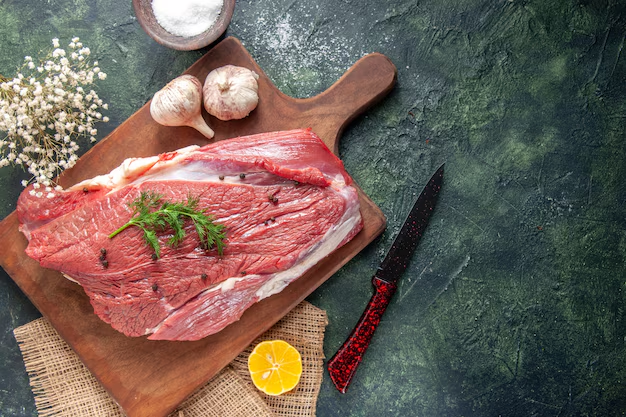How Long Can You Really Keep Beef in the Refrigerator?
Picture this: you return home from the grocery store, haul out the neatly packaged beef, and slide it into the refrigerator. Days might pass before you think about that beef again, and the question pops into your mind: How long is too long to keep beef in the fridge? Navigating the nuances of food storage can be confusing, but keeping beef fresh is essential for not only flavor but safety. In the following guide, we'll explore the shelf life of beef in your refrigerator, delve into the science behind spoilage, and share tips to keep your beef fresher for longer.
🥩 Understanding Beef and Its Shelf Life in the Fridge
Types of Beef and Their Differences
Before determining how long beef lasts in the fridge, it’s helpful to clarify the different types of beef you might be dealing with.
- Ground Beef: This is typically more perishable due to the increased surface area exposed to bacteria.
- Steaks and Roasts: These cuts tend to last longer due to their larger size and muscle fibers, which offer some protection.
- Cooked Beef: Already prepared or leftovers have a different shelf life compared to their raw counterparts.
The Science of Beef Spoilage
Beef spoilage is primarily a result of microbial activity. Bacteria such as Escherichia coli and Salmonella thrive at warmer temperatures, but refrigeration slows their growth considerably. However, even in the cool environment of a fridge, spoilage can continue.
Factors Affecting Shelf Life:
- Temperature: Aim for a consistent refrigerator temperature of 40°F (4°C) or lower.
- Packaging: Properly sealed packages limit air exposure.
- Cross-Contamination: To avoid bacterial transfer, store beef separately from other raw foods.
🗓️ How Long Does Beef Last in the Refrigerator?
Raw Beef
- Ground Beef: Generally lasts about 1-2 days. Due to the grinding process, this type is more susceptible to bacteria.
- Steaks and Roasts: These cuts can last anywhere from 3 to 5 days depending on initial freshness and how they're stored.
Cooked Beef
After being cooked properly, beef should last 3 to 4 days in the fridge. Keep it in an airtight container to reduce exposure to air and other contaminants.
Embrace the Freezer
Beef can remain fresh far longer when frozen. Both raw and cooked beef can be frozen for several months, but it's crucial to use proper storage bags or vacuum sealing to prevent freezer burn.
🛡️ Best Practices for Storing Beef
Proper Packaging
Using vacuum-sealed bags or tightly wrapping beef in aluminum foil or plastic wraps can significantly extend its life by minimizing air exposure.
Refrigerator Organization
Storing beef on the lower shelves of your fridge, where temperatures are typically coldest, can keep it fresh longer. This practice also prevents cross-contamination in case of leaks.
Monitor Your Fridge Temperature
Consider investing in a thermometer to ensure your refrigerator is consistently running at the optimal temperature for food storage.
🔍 Identifying Spoiled Beef
Even with the best practices, beef can still spoil. Knowing when to throw it out is crucial.
Signs of Spoilage
- Smell: A sour, off-putting odor is a clear sign of spoilage.
- Texture: Sticky or slimy residue isn't normal and indicates bacterial growth.
- Color: Discoloration, especially a greenish hue or excessive browning, may suggest spoilage, though some darkening is a normal part of oxidation.
🥇 Quick Reference Guide to Beef Storage
Here's a handy overview with some useful tips for keeping your beef fresh:
| Type | Shelf Life in Fridge | Storage Tips |
|---|---|---|
| Ground Beef | 1-2 days | Store on lower shelves, tightly sealed. |
| Steaks/Roasts | 3-5 days | Keep away from other meats. |
| Cooked Beef | 3-4 days | Use airtight containers. |
| Freezer Option | Freeze for up to 3 months. |
🥩 Pro Tips for Beef Lovers
- 🧊 Freeze if in Doubt: Not planning to cook the beef soon? Popping it in the freezer can prevent premature spoilage.
- 🔍 Trust Your Senses: Trust your nose and eyes to detect any changes in the beef.
- 📅 Label Everything: Note the date of purchase and expected expiration—it'll prevent unnecessary risk.
- 🛄 Avoid Overcrowding: Keep your fridge organized to allow consistent airflow around stored items.
Fresh Beef, Satisfied Palate
Armed with this knowledge, you're now ready to store your beef with confidence, savoring its flavor safely days later. By understanding spoilage signs and applying best practices for storage, you can make the most of your meals and reduce waste. Each steak, roast, or pack of ground beef represents endless delicious possibilities, made safer and tastier by being mindful of proper storage. Enjoy every bite!

